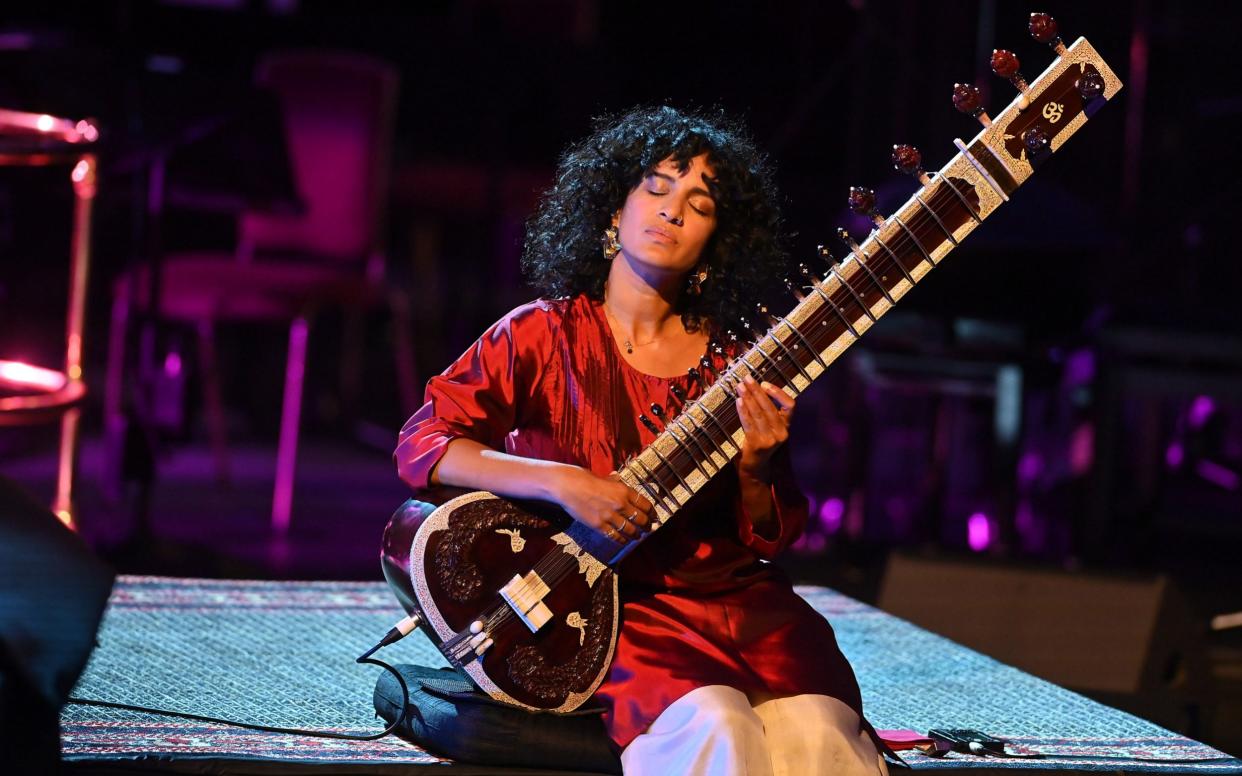Proms 2020: Anoushka Shankar and Jules Buckley, review: boldly taking the sitar where no sitar has gone before

This was one of the strangest Proms you could imagine, a voice from beyond the grave launching a medieval Indian instrument on a journey into space. Sitar Trek, boldly going where no sitar has gone before.
The late great sitar guru Ravi Shankar would have turned 100 this year. His careful, precise teacherly voice was almost the first sound to be heard in this extraordinary sci-fi musical adventure, in a sample fired up from a laptop by British electronic producer Derwin Schlecker, known as Gold Panda.
“Ragas are precise melody forms, a raga is not a mere scale,” Shankar declared, whereupon his seated daughter Anoushka Shankar played a simple scale on her own enormous sitar, like a dutiful beginner. Shankar senior’s voice continued issuing instructions about “ascending and descending modes”, “uses of microtones and stresses”, while his pupil followed with examples. But when Shankar’s voice was heard saying that “the soloist does a free improvisation”, the piece achieved lift off.
In a shimmering red and white dress, the stylish 39-year-old Anoushka Shankar cut a figure as eye-catching as any pop diva. And with bare feet poised above an array of effects pedals that would have been the envy of a heavy metal guitar hero, she played her stringed instrument with dazzling nimbleness and fluidity, sensitively bending notes and concocting riffs that might have left Jimmy Page weak at the knees. All the time, she was smiling with beatific delight, as if in perfect communion with her instrument, occasionally looking up to lock eyes with Gold Panda.
The bearded boffin in a yellow beanie hat was nodding his head and twiddling his own impressive selection of switches and knobs. Schlecker’s synthetic sound waves, droning samples and jittery microbeats subtly underpinned and weaved through Anoushka’s melodious playing. There were moments when it sounded like a folk jig on a space station and other times when it almost threatened to turn into a dark drum-and-bass club banger. But there was a delicate sympathy on display that ensured one side of the musical experiment never overwhelmed the other, so the overall effect was a sweetly flowing ever shifting ambience.

Ravi Shankar really brought Indian music to Western ears through his association with George Harrison and The Beatles in the pop world and Yehudi Menuhin in the classical world. His British-Indian daughter, Anoushka, studied with her father from seven years old. The half-sister of jazz soul star Norah Jones, Anoushka has developed into a brilliant composer, with all the tools to take the instrument further than perhaps even her father could have ever dreamed.
The second half of the Prom focused on Shankar performing original compositions from her own 10 albums, with Jules Buckley conducting a socially distanced Britten Sinfonia. The pieces extended from sweeping cinematic epics to sensually intimate jazz moods. Austrian percussionist Manu Delago sat in as featured guest, playing the Hang drum, a modern form of handpan that looks like a flying saucer and emits ringing melodic notes that could be the music of the spheres.
Whatever these bold and inventive players had imagined for the future of their music, it surely did not include performing in an empty venue during a pandemic. Broadcast media offers a very sterile way of interacting with instrumental music that requires intense focus in order not to drift into background ambience. But Anoushka Shankar’s sitar explorations are nothing if not atmospheric, and the pleasure of seeing close ups of musicians expressing unbridled joy at playing such fantastic pieces together almost compensated for not being there. To paraphrase a certain Mr Spock: “It’s live, Jim, but not as we know it.”